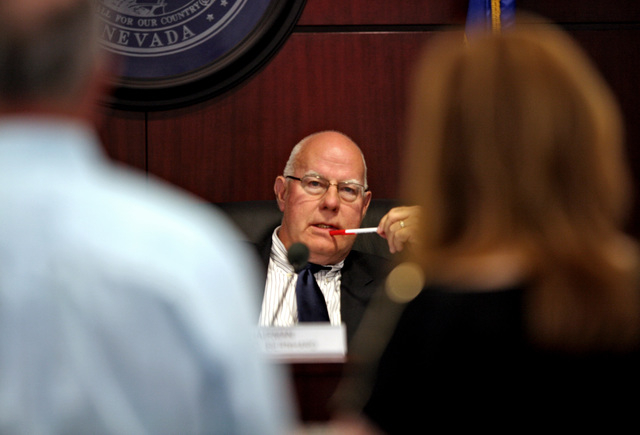Gaming Commission loses a legendary chairman

As he was exiting the Sawyer Building’s second-floor hearing room following a Nevada Gaming Commission monthly meeting, Chairman Peter Bernhard was complimented by a state gaming enforcement agent on his handling of individuals and companies seeking licensing approval.
Whether it was a corporate executive whose company operates multiple Strip resorts or a small- business person opening a single restricted location with a few slot machines, Bernhard treated every applicant with the same degree of fairness.
The agent’s comment meant the world to Bernhard.
In his 13 years as chairman, the Gaming Commission ruled on thousands of license applications and regulatory matters big and small.
“Everyone deserves an explanation on a decision,” Bernhard said. “I always wanted to make sure everyone received a fair opportunity and understood why the commission took a particular position.”
Fairness is one reason Bernhard is stepping away from the Gaming Commission he has led as chairman longer than anyone.
His last official day is Monday, but he decided to leave the panel months ago. Former Southern Nevada Water Authority General Manager Pat Mulroy will serve out Bernhard’s last 10 months.
Bernhard’s term ends in April. The move’s timing lets new Gaming Commission Chairman Tony Alamo Jr. participate in both the run-up to the 2015 Legislature, and the session itself. Frankly, Bernhard, 65, didn’t want to get in the way.
Gov. Brian Sandoval reappointed Bernhard in 2011 to shepherd creation of Nevada’s initial real-money online poker operations.
Mission accomplished.
“That was the one last issue,” Bernhard said. “Once the I-gaming bill passed and allowed for interstate compacts, I felt I completed the last goal.”
The next chairman will be challenged to match the theme-park thrill ride of Bernhard’s tenure.
Bernhard’s time in the center chair included two crucial events — Sept. 11, 2001, and the recession.
The casino industry suffered financially after the terrorist attacks that virtually halted travel across the United States. A few years later, the economic meltdown erased the 9/11 recovery and sent state gaming revenue plummeting almost 20 percent in 24 months.
The Strip has slowly recovered in the past three years, but has not regained 2007’s high point, when the state averaged more than $1 billion in gaming revenue per month.
Meanwhile, the Gaming Commission approved several multibillion-dollar mergers and the arrival of private equity investment. The panel also signed off on record fines for regulatory violations by gaming companies.
But Bernhard would prefer his tenure be noted for an idea that never collected headlines.
Rather than simply approve nonrestricted license applicants who didn’t have any regulatory concerns, Bernhard took a few minutes at each hearing to read into the record the licensees’ names, education and career accomplishments. He’s hoping Alamo and subsequent chairmen continue the practice.
One of Bernhard’s favorite moments came in 2007. His son Bo Bernhard, the executive director of UNLV’s International Gaming Institute, unveiled findings from the first Nevada study on Internet gaming to the commission. The institute was hired by the separate Gaming Control Board, and Peter Bernhard didn’t know his son would present the report until a few days before the hearing.
To his surprise, his wife of 42 years, Susie Bernhard, attended the hearing to watch the interaction between father and son.
A Las Vegas attorney, Bernhard knew gaming regulations better than anyone on the part-time, five-person commission.
He stuck to his guns on certain issues. In 2011, the Gaming Commission voted 4-to-1 to approve regulation changes for the tavern industry — mainly to blunt growth of the Dotty’s chain. Bernhard was the lone opposition vote, and still believes gaming regulators shouldn’t impose their views on a particular business model.
Last month, he backed up that opinion during the final meeting of a legislative panel that seemed more intent on killing off Dotty’s than discussing its intended purpose of studying technology in gaming.
Bernhard eviscerated the opposition by citing pages of Gaming Control Board statistics showing the Dotty’s business model of minimal food and beverage with a heavy reliance on gaming had not buried the state’s tavern industry.
Bernhard, a registered Democrat, was appointed and reappointed by three Republican governors. Gov. Kenny Guinn asked Bernhard, who was chairman of the Nevada Ethics Commission, to replace Sandoval in September 2001.
Bernhard served with nine board members in his 13 years, including three former state senators.
Longtime commission followers said Bernhard was the least political of any chairman. He never planned to use the post as a stepping stone to higher office.
Sandoval went from Gaming Commission chairman to attorney general to federal judge to governor. For Senate Majority Leader Harry Reid, D-Nev., a four-year term as Gaming Commission chairman helped revive a political career that seemed dead following losses in elections for the U.S. Senate and Las Vegas mayor.
At Bernhard’s final meeting this month, Commissioner Randolph Townsend, a former state senator, suggested the chairman had the demeanor and legal savvy to make a terrific Nevada Supreme Court Justice.
“Not that I’m trying to start your political career,” Townsend said.
Bernhard put that talk to rest.
With two grandchildren in Las Vegas and a third on the way from his daughter Blythe Bernhard — a health and medical reporter for the St. Louis Post-Dispatch — he has other priorities in mind.
My guess is he’ll treat all grandchildren equally.
Howard Stutz’s Inside Gaming column appears Wednesdays and Sundays. He can be reached at hstutz@reviewjournal.com or 702-477-3871. Follow on Twitter: @howardstutz.












